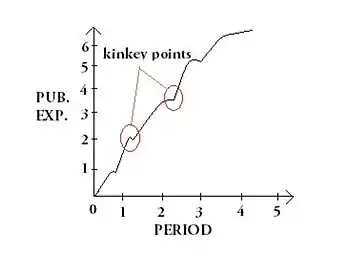Wagner's law
Wagner's law of state , is known as the law of increasing state spending, is a principle named after the German economist Adolph Wagner (1835–1917).[1] He first observed it for his own country and then for other countries. The theory holds that for any country, that public expenditure rises constantly as income growth expands. The law predicts that the development of an industrial economy will be accompanied by an increased share of public expenditure in gross national product:
The advent of modern industrial society will result in increasing political pressure for social progress and increased allowance for social consideration by industry.
| Public finance |
|---|
 |
|
Wagner's law suggests that a welfare state evolves from free market capitalism due to the population voting for ever-increasing social services as general income levels grow across broad spectrums of the economy. In spite of some ambiguity, Wagner's statement in formal terms has been interpreted by Richard Musgrave as follows:
As progressive nations industrialize, the share of the public sector in the national economy grows continually. The increase in State Expenditure is needed because of three main reasons. Wagner himself identified these as (i) social activities of the state, (ii) administrative and protective actions, and (iii) welfare functions. The material below is an apparently much more generous interpretation of Wagner's original premise.
- Socio-political, i.e., the state social functions expand over time: retirement insurance, natural disaster aid (either internal or external), environmental protection programs, etc.
- Economic: science and technology advance, consequently there is an increase of state assignments into the sciences, technology and various investment projects, etc.
- Historical: the state resorts to government loans for covering contingencies, and thus the sum of government debt and interest amount grow; i.e., it is an increase in debt service expenditure.

As per the study on public expenditure for the period 1891–1955[3] in U.K. conducted by Peacock and Wiseman based on Wagner's Law, it was found to be still applicable.
It was further stated that:
- there has been considerable increase in revenue to the governments due to the economic developments over the years, thereby leading to a boost in public expenditure;
- the government simply cannot ignore the demands that people make regarding various services, especially when there is an increase in revenue collection at a constant rate of taxation;
- during times of war, tax rates are increased by the government to generate more funds to meet the increase in defense expenditure. This is known as the displacement effect.[4] Such 'displacement effect' is created when the earlier lower tax and expenditure levels are displaced by new and higher budgetary levels. But it remains the same even after the war as people get used to them. Therefore, the increase in revenue results in rise in government expenditure.
References
- Wagner, A. 1890 Finanzwissenchaft, Winter, C. F., Leipzig
- Singh, S.K (2008). Public Finance in Theory and Practice. S.Chand. p. 35. ISBN 81-219-1091-9.
- "The Peacock–Wiseman Hypothesis". Retrieved 9 December 2011.
- "Displacement Effect Hypothesis of Peacock and Wiseman" (PDF). Retrieved 9 December 2011.